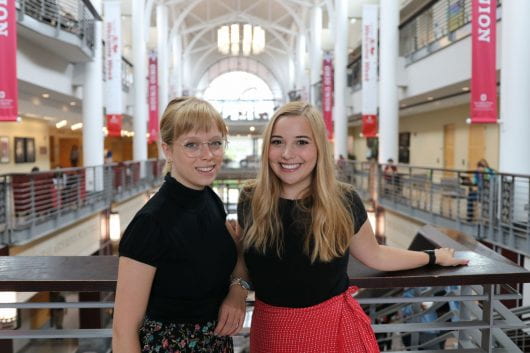
Kate Greer and Julia Dennen, USG president and vice president. Credit: Casey Cascaldo | Managing Editor for Multimedia
Undergraduate Student Government leaders Kate Greer and Julia Dennen have a lot planned for their first full semester in office, and for many of the items on their agenda, it’s personal.
Following a summer of “inspiration-gaining,” Greer, a fourth-year in European history and German and president of USG, and Dennen, a fourth-year in public affairs and vice president of USG, plan to pursue initiatives in the areas of financial information and accessibility, health and wellness, and equity and justice.
In terms of finances, Greer and Dennen said they want students to be able to reapply for merit-based aid when they miss the early action deadline. It would apply mainly to nontraditional and out-of-state students who miss the early action deadline.
Dennen, who is an out-of-state student financially responsible for her tuition, said that she missed the Nov. 1 deadline as an applicant because she didn’t know Ohio State was her future college.
“Your lack of knowledge about dates and deadlines when you are 17 years old should not be putting financial shackles on you for decades to come,” Dennen said. “There should be more leniency, there should be clearer communication and there should be a lot of compassion.”
Greer said that the USG leaders want to create universitywide guidelines for withdrawal and re-enrollment for medical circumstances such as mental health, a recommendation that came from University President Michael V. Drake’s Suicide and Mental Health Task Force.
Dennen said they want to focus on health care options for students who use Medicaid, as Medicaid is currently accepted at the Wexner Medical Center, but not the Student Health Center.
“This is your home,” Dennen said. “You should feel safe and happy and supported in your home.”
Dennen, as she reflected on Ohio State’s 150th year, said she felt it was time to review and revise the university talks about diversity and inclusion, including the term itself.
“We want to get the people who have lived these experiences in the room, not just to occupy a seat, but to lead the charge,” Greer said.
Greer and Dennen said that their plans for equity and justice — their third area of focus this semester — and improved terminology for diversity and inclusion, include a universitywide absence policy, especially for students of faith.
“There is none,” Greer said. “There is no universitywide absence policy. There’s something in faculty rules that says it’s up to the professors.”
Dennen said that in one instance, she had to provide a link to a livestream of a Yom Kippur service she was attending in order to get permission to be absent from a class. Greer said she had to produce copies of her mother’s obituary in order to miss a midterm.
Dennen said that systems should be in place to protect students and their identities.
“We shouldn’t be forcing students to pick different parts of their identity,” Dennen said. “You are a student and you’re a million other things, and you don’t have to compromise any of those other things to be a good student.”
Equity and justice studies, task forces and strategic plans should be implemented to further understand the realities of students, such as studies about housing and food security among students and a strategic plan to combat sexual violence, Greer and Dennen said.
Greer also said that for the first time, Ohio State will begin actively recruiting diverse faculty through a committee focused on diversity, inclusivity and equity in human resources, which will help retain Ohio State’s diverse student populations.
“If we’re going to talk about retention –– how do we retain underrepresented populations — is we make the faculty that we hire as diverse as they are,” Greer said.
Dennen said that the goal of their administration’s agenda is to hold Ohio State to a higher standard.
“That’s what the sesquicentennial means to us, is: What can we do now? What can we start so that 150 years from now, the conversations aren’t the same ones?” Dennen said.


